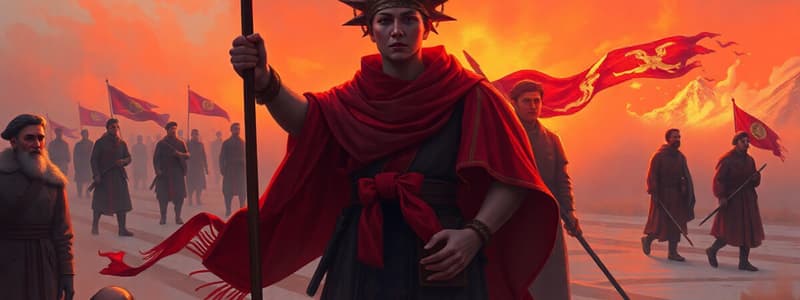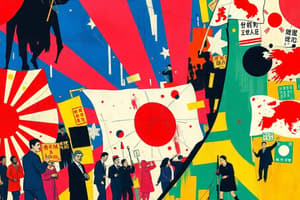Podcast
Questions and Answers
How does nationalism differ from ultranationalism?
How does nationalism differ from ultranationalism?
- Nationalism always seeks independence from imperial powers.
- Ultranationalism is focused solely on economic development.
- Ultranationalism may lead to the exclusion of others based on ethnicity. (correct)
- Nationalism promotes cooperation among nations.
What factor played a significant role in shaping the development of nationalism during the French Revolution?
What factor played a significant role in shaping the development of nationalism during the French Revolution?
- The establishment of global alliances.
- Increased international trade agreements.
- The rise of a collective national identity. (correct)
- Technological advancements in warfare.
What is a key characteristic of ultranationalism as an ideology?
What is a key characteristic of ultranationalism as an ideology?
- Support for democratic governance.
- Emphasis on cultural superiority and territorial expansion. (correct)
- Promotion of multiculturalism.
- Focus on global peace initiatives.
Which event is closely associated with the ultranationalism that led to genocide?
Which event is closely associated with the ultranationalism that led to genocide?
In what way did nationalism influence Canada's response during the conscription crises of World War I and II?
In what way did nationalism influence Canada's response during the conscription crises of World War I and II?
What is the concept of national interest primarily concerned with?
What is the concept of national interest primarily concerned with?
During which historical period did ultranationalism significantly shape foreign policy, especially in relation to peace settlements?
During which historical period did ultranationalism significantly shape foreign policy, especially in relation to peace settlements?
Which term refers to the idea of expanding a nation's territory to provide living space for its population, often associated with ultranationalist ideology?
Which term refers to the idea of expanding a nation's territory to provide living space for its population, often associated with ultranationalist ideology?
What term best describes the policy where a country extends its power and dominance over other nations?
What term best describes the policy where a country extends its power and dominance over other nations?
Which event is associated with the forced relocation and internment of Japanese Canadians during World War II?
Which event is associated with the forced relocation and internment of Japanese Canadians during World War II?
What treaty officially ended World War I and imposed reparations on Germany?
What treaty officially ended World War I and imposed reparations on Germany?
What was the primary cause of the Ukrainian Famine in the 1930s?
What was the primary cause of the Ukrainian Famine in the 1930s?
What term describes the military tactic used by Germany to quickly conquer territories in World War II?
What term describes the military tactic used by Germany to quickly conquer territories in World War II?
Flashcards
Imperialism
Imperialism
A policy of extending a country's power and influence through colonization, diplomacy, or military force.
Trench Warfare
Trench Warfare
A type of warfare where armies fight from fortified trenches, resulting in high casualties and a stalemate.
Annexation
Annexation
The forced takeover of land or territory by a stronger nation.
Holodomor
Holodomor
Signup and view all the flashcards
Self-Determination
Self-Determination
Signup and view all the flashcards
Ultranationalism
Ultranationalism
Signup and view all the flashcards
Nationalism
Nationalism
Signup and view all the flashcards
National Self-determination
National Self-determination
Signup and view all the flashcards
National Interest
National Interest
Signup and view all the flashcards
Genocide
Genocide
Signup and view all the flashcards
Superiority Beliefs
Superiority Beliefs
Signup and view all the flashcards
Appeasement
Appeasement
Signup and view all the flashcards
Propaganda
Propaganda
Signup and view all the flashcards
Study Notes
Ultranationalism and Genocide Exam
- Ultranationalism is shaped by historical, geographical, political, economic, and social factors (e.g., French Revolution, contemporary examples)
- National interest shapes foreign policy (e.g., First World War peace settlements, interwar period).
- Nationalism and ultranationalism are analyzed during conflicts, such as World War I and II, including examples of internment in Canada and conscription crises.
- Ultranationalism is a cause of genocide (e.g., Holocaust, 1932-1933 Ukrainian famine, contemporary examples).
- Pursuit of national self-determination has impacts (e.g., Québécois nationalism and sovereignty movement, First Nations, Métis, and Inuit self-government, contemporary examples).
World War I
- Alliances (Triple Alliance, Triple Entente) were major factors.
- Imperialism and militarism contributed to the war.
- National interests played a role before the war.
- Trench warfare resulted in a stalemate.
- Shell shock was a significant psychological impact of the war.
- Canada's role included the Vimy Ridge offensive and conscription crises.
- Post-war National Interests influenced the Treaty of Versailles, reparations, and hyperinflation.
- New countries emerged.
- League of Nations was formed.
World War II
- Appeasement of Nazi Germany was a significant factor.
- Nazi Germany's expansionist policies included the Holocaust, Lebensraum, and Kristallnacht.
- Key figures like Hitler and Stalin influenced events.
- Five-year plans, purges, and show trials were part of Stalin's regime.
- Ukrainian famine (Holodomor).
- Russo-German Pact and Anschluss
- Invasion of Poland triggered World War II.
- Important events include Pearl Harbor, D-Day, Hiroshima, and Nagasaki.
- Impacts of the war include the concept of peacekeeping, self-determination, and genocide.
- Canada's role in World War II involved conscription crises and internment.
Significant Individuals and Events
- Adolf Hitler and Nazi Germany had key roles in the Holocaust and World War II.
- Joseph Stalin's actions in the 1932-1933 Ukrainian famine.
- The Enabling Act gave Hitler extraordinary powers.
Studying That Suits You
Use AI to generate personalized quizzes and flashcards to suit your learning preferences.




